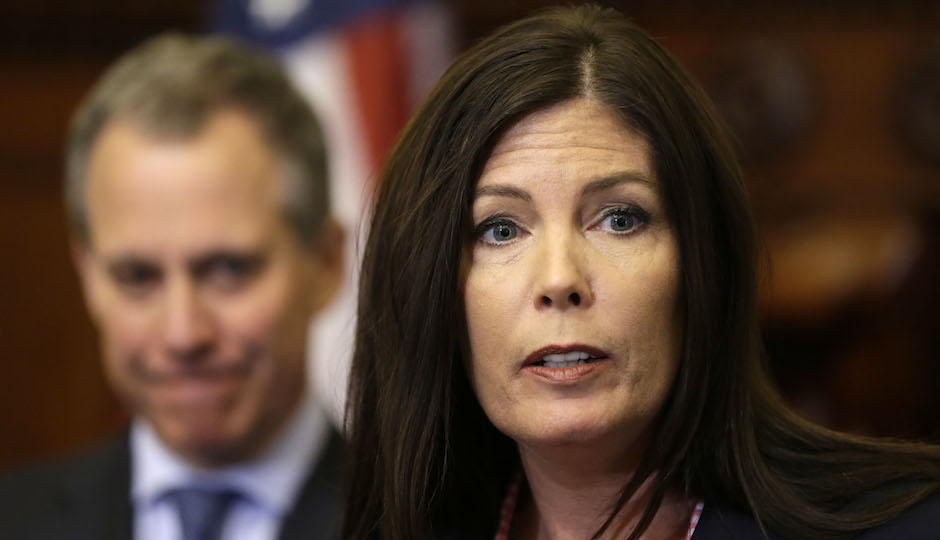The Inquirer’s Journalism Is in Real Trouble

Kathleen Kane. AP Photo | Matt Rourke
A couple of weeks ago, I was interviewing an Inquirer journalist about some bit of newsroom dysfunction — there’s always some bit of newsroom dysfunction — when she expressed some concern that the company’s ownership fracas would end up undermining the paper’s journalism.
It wasn’t so much a fear of meddling by the paper’s owners; you can pretty much depend on newspaper journos to rebel at the first hint of editorial interference. The problem, she suggested, was an absence of strength: In the good old days of long-tenured, deep-pocketed owners who were in the business for the long haul, a journalist could go out and dig for muck, then print it, knowing there were plenty of resources to back him or her up if some offended party decided to get litigious.
With the Inquirer’s ownership divided against itself, she wondered, would there be enough resources to support those hard-nosed journalists? And if not, she said, what would become of the paper’s accountability journalism — the kind of investigations into public officials and their decisions that remains a hallmark of the paper even in its diminished state? She was fearful.
And now it seems we might find the answers to her questions.
News broke Thursday night that Attorney General Kathleen Kane has retained attorneys to represent her in a possible defamation complaint “involving” the Inquirer — this after the paper’s Sunday story detailing how she abandoned a case in which investigators caught Philly Democrats on tape taking unreported cash payments from a confidential informant.
And she is, of course, the second Pennsylvania state official just this month to go public with legal threats against the paper: Supreme Court Justice Seamus McCaffery filed notice to sue the Inquirer a few weeks back, following a 2013 stories about referral payments his wife received — stories that prompted a change in state judicial ethics rules and an FBI investigation of McCaffery.
It’s quite something for one public official to sue a newspaper. For a second to even threaten it within the same month is almost unheard of. The fact that it’s happening here and now suggests that the Inquirer’s ownership struggles have finally pushed the paper to a critical point where its journalism is concerned.
Why? Because of the nature of American libel law.
Let’s be clear: It would be premature to weigh in on the merits of the respective cases. In McCaffery’s case, a formal complaint hasn’t yet been filed — though it can probably be expected next week — and in Kane’s case, we don’t even have preliminary paperwork.
Nonetheless, there’s a reason you don’t often see public officials sue newspapers and TV stations for reporting they don’t like: For public figures, American libel law generally requires them to prove that a journalist and that journalist’s organization committed “actual malice” — not that they were just wrong about the facts, essentially, but that they recklessly or purposely disregarded the real facts of a story.
It’s a tough standard to meet in a courtroom, and deliberately so: The judges who crafted it didn’t want public officials to shut down scrutiny or stifle debate with an endless series of lawsuits against their critics. Democracy would flourish only with such debate and scrutiny, they believed.
You see where this is going, right?
The result is that lots of politicians gripe about the coverage they receive; many (if not most) believe the coverage they personally receive at some point is dreadfully, possibly purposefully, unfair. Because of the law’s requirements, though, many politicians simply complain about the bad press and move on. Under normal circumstances, even a run of extraordinarily bad — or adverse —journalism might end merely with subtler forms of revenge, like refusing to take questions from an outlet’s reporter at press conferences and other freeze-outs. Dick Cheney banned New York Times reporters from his plane. He didn’t sue them.
Again, this isn’t to weigh the merits of the complaints against the paper. But the existence of multiple legal threats, given the “actual malice” standard — and given the even older advice to officials to “never argue with somebody who buys ink by the barrel” — suggests that officials are starting to see the Inquirer, with its fractious ownership, as weak and vulnerable, its journalism more easily challenged. They’ve been given ample reason to think so.
If they’re right, the Inquirer may become too diminished to challenge anybody with its reporting. That wouldn’t be bad just for the Inky, or for its readers. It would be bad for governance in Philadelphia, and Pennsylvania, too.
Follow @JoelMMathis on Twitter.


